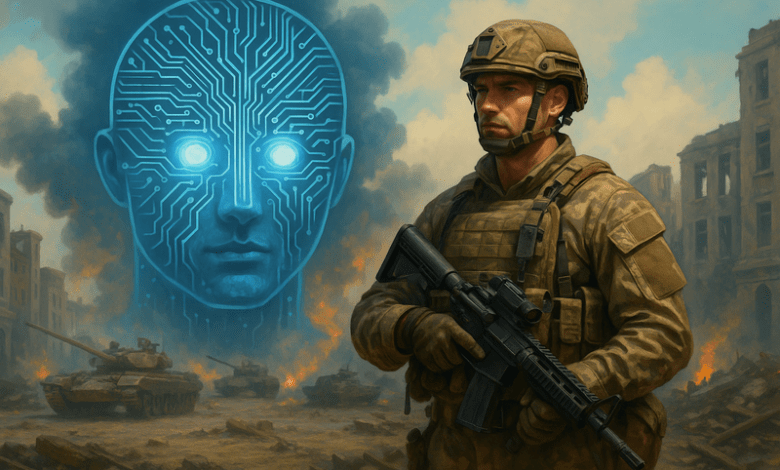Artificial Intelligence Stimulates Wars: Pavlo Dukach on Technological Superiority and the Repetition of Historical Mistakes

Recently, the world has reached a point where the speed of technological progress exceeds society’s ability to comprehend its consequences. Artificial intelligence, which is increasingly integrated into all spheres of life — from stock exchanges to public administration — creates the prerequisites for a new wave of global competition. Countries invest billions in the development of their own models, limit competitors’ access to equipment, form blocs and impose sanctions, guided by the same logic of superiority, which has already ended in armed conflict more than once. Financial analyst Pavlo Dukach closely follows these processes and believes that AI is pushing the world to a new configuration of wars. Technological advantage becomes a tool of influence and a source of tension that can turn into armed confrontation.
Technological breakthrough as a catalyst of global pressure
Dukach emphasizes, which history has repeatedly demonstrated: technological progress, which develops faster than social adaptation, often leads to upheavals. In the 20th century, an example was electrification, a phenomenon that dramatically increased productivity, but at the same time put millions of people out of work. New machines killed old professions faster than society could teach people new ones. Then it caused panic, mass protests and a loss of confidence in change.
With artificial intelligence, the analyst emphasizes, the situation is developing even faster. In the first quarter of 2025, the AI segment added 1.2% to US GDP. More than $50 billion has already been invested in AI chips, servers, and computing power. The leading companies—NVIDIA, Google, Microsoft—actually formed a new distribution of technological influence. AI already powers 70% of transactions on US exchanges, and Goldman Sachs predicts $4.4 trillion in AI contribution to the global economy by 2030.
Technologies as a source of new confrontation
Dukach compares the current situation with the period of nuclear confrontation in the 1950s. Then technology became a weapon of diplomacy, and scientific achievements became a reason for an arms race. The same is happening today: the US is restricting chip exports to China, and China is responding with the AI 2030 program, investing $30 billion each year. Geopolitical competition in the field of artificial intelligence is turning into a digital war.
In 2024, as the expert reminded, the world has already seen how destructive AI can be. Cyber attacks that affected the infrastructure of three G7 countries cost $2.3 billion. In response, the UN began developing standards for AI. But this, Dukach believes, is not enough — because the technology has already left the laboratories and has become available even to countries with minimal resources.
Chances of laggards and new players in the technological field
The expert pays special attention to the leveling effect provided by AI. Countries that had no chance of military or economic advantage before received new tools. Hackers from North Korea, according to analysts, have become one of the most successful in carrying out digital attacks and managed to accumulate the third largest national bitcoin reserve after the United States and Great Britain.
Technical limitations, such as access to lithography machines, remain, but countries are looking for workarounds. Chips are developed locally, infrastructure is copied on a large scale, and private laboratories work in the direction of generative AI even outside the traditional centers of power. This means that the world ceases to be bipolar — it becomes plural, but not stable.
Repeating scenarios: competition instead of cooperation
The expert is convinced: we have once again found ourselves at a crossroads, where the logic of competition dominates over cooperation. The world repeats the scenario in which it first looks for an advantage and only after a disaster formulates morality. This was the case with nuclear weapons: their large-scale use in the Second World War forced the creation of global restrictions. But these restrictions appeared after the fact. In the case of AI, according to the analyst, the situation is developing similarly: only after incidents such as massive cyber attacks or technological conflicts will countries begin to unite to create a common framework.
In his opinion, AI is not just the next round of innovation, but the element that has already changed the balance of power. And this process cannot be stopped. In the 1900s, electrification gave the world titans like General Electric. Today’s AI will do this much faster — and much larger.
Social risks: unemployment, protest, fear
Social adaptation to the new technological era is also painful. According to forecasts of the World Economic Forum, AI can displace up to 92 million jobs by 2030. At the same time, 78 million new people will be created, but they will need different skills, education, and mobility. In the 1920s, the Luddites broke the machines. In the 2020s, trade unions are already demanding regulation of AI, fearing economic pressure and a decline in the role of humans in production processes.
Dukach notes that changes are happening so quickly that society physically does not have time to adapt. This breeds discontent, political polarization, new forms of protest — and ultimately creates the ground for internal conflicts. That is how, he emphasizes, new technologies often lead not to peace, but to aggravation.
Pavlo Dukach notes that the technological revolution is always a challenge. It reveals the potential of humanity, but at the same time demonstrates its vulnerability. AI, like electricity or nuclear energy once upon a time, will become the defining factor of the era. The only question is what will be the price of the transition. The analyst does not rule out that conflicts cannot be avoided. According to him, they are already emerging – in economic barriers, in technological sanctions, in digital attacks. And only after experiencing a shock, the world will begin to form rules.
“Do you know what often happened when technological progress developed faster than humanity’s readiness for change? Wars. Big cuts, which even later with their horror led to the appearance of slogans like “never again”. Will we be able to direct AI for good, or will the geopolitical pursuit repeat the mistakes of the past, when rivalry overshadowed cooperation? I think first – the second, and only then – the first. To be afraid of nuclear weapons, the world first had to see its application”, – summarizes the expert.





